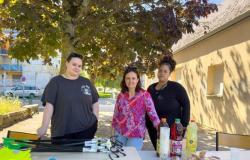Photo credit, Paul Mahlasela
Updated 14 minutes ago
Regina Mary Nlodvu says she was playing in her garden when she was first sexually assaulted by a man she trusted.
“He gave me candy and asked me to sit on his lap,” she recalls.
Regina says it was the first time she was sexually abused – at the age of eight – but it wouldn’t be the last.
She says the same man returned to her home in Ennerdale, South Africa, under the pretext of visiting her parents, and sexually assaulted and raped her numerous times over the years that followed.
He wasn’t the only one, she told the BBC. Regina says she has suffered other assaults – sexual and non-sexual – over the years.
The 34-year-old explains that her attacker targeted her because she was born with albinism, a hereditary disease that affects the production of melanin, the pigment that gives skin its color.
It’s because he wrongly believed that raping her would prevent him from getting sick, Regina explains.
This idea is one of many dangerous myths surrounding albinism.
Today, after years of battling depression, the Zambian-born South African actress is campaigning for a better understanding of people living with this illness.
Although she only learned to read and write ten years ago, at the age of 24, she also wrote and starred in her own play about albinism and her own life.
The new mom wants to make sure others don’t experience what she did by tackling the myths surrounding the condition.
Some believe that a lock of white hair from an albino can bring fortune and wealth, while others believe more sinister misconceptions, including that having sex with someone with the condition can cure HIV .
Since the outbreak of Covid-19, false rumors have also circulated that it can cure the coronavirus.
People with albinism have been kidnapped and killed because they wrongly believed their body parts had magical powers.
“When I was five, a crowd of children gathered every day at the gate at the end of our garden,” she remembers.
When Regina approached them, thinking they wanted to play, they would run away.
She thought it was a game, until a woman came into the yard one day with her little daughter.
“The little girl looked at me and burst into tears,” she said. “She thought I was a monster and it really upset me.
Regina also noticed her classmates spitting inside their t-shirts when she walked past them.
She later learned that it was a superstitious gesture – something they thought would protect them from the curse of having an albino child of their own.
Regina had difficulty keeping up in school due to her condition. She had difficulty seeing the blackboard due to her reduced eyesight (a common feature of albinism), and can still only see a small distance in front of her.
But when she complained, the teacher told her there would be “no special arrangements” made for her.
Regina left school unable to read or write, which made it difficult for her to find work. But in 2013, she discovered an audiobook of the Bible that transformed her life.
“I used to freeze when I saw books – they made me feel stupid and my whole world would stop,” she explains.
“But I started listening to audiobooks, I realized there was a beautiful connection between sounds and words, and the world opened up to me.
She dabbled in theater and, with the help of the Young African Leaders Initiative, was able to write and perform a one-woman play called “Mary, My voice.”
“When I was young, people with albinism were completely unrepresented on screen,” she says. “I want to change that.
An audience member at the Regina show, inspired by the play, paid to enlist the help of a private tutor to begin learning the basics of reading and writing.
“I still find reading and writing difficult, but the fact is that I’m not as terrified as I used to be,” she explains.
Regina hopes that one day she will be able to help her granddaughter with her homework at school.
For the moment, she is still in the fog of early motherhood, relieved by a difficult pregnancy.
“Look at her, look how beautiful she is,” she said, gushing over her newborn, a girl named Bohlale Sabelo Isabel.
Bohlale wasn’t born with albinism, but Regina says that if she had, she “would have been happy.”
“It’s something I’ve grown to love,” she says, “she’s my whole world and I hope to give her the opportunities I never had.”






